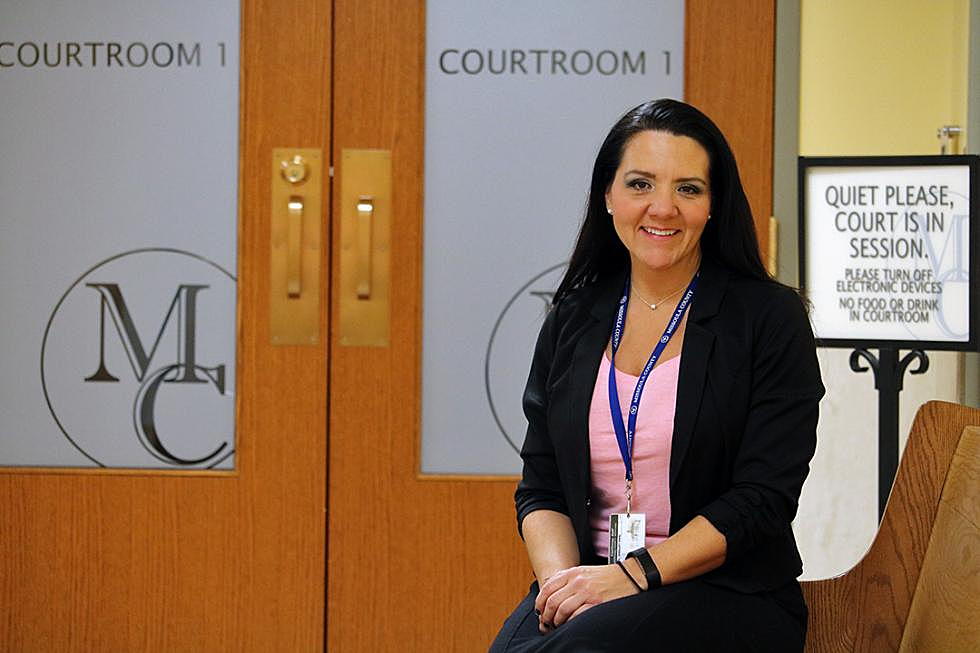
New treatment court coordinator may be fresh to the job, but not the issue of addiction
On the third floor of the Missoula County Courthouse, Shelley Grados lined out several must-do tasks on a Monday morning as she geared up for a busy week in Co-Occurring Treatment Court.
Some of the court's participants will be veterans, some not, though all have been in trouble with the law and suffer from some form of substance abuse mixed with a mental health disorder.
As the court's new coordinator, Grados is eager to do her part to get them on track.
“I started off wanting to be a teacher and ended up doing this, simply because I'm passionate about working with people and helping them in a way that can set them on the right path,” said Grados. “But you can only do so much for them. A lot of it has to be their own willingness to change.”
Grados took the job as the court's coordinator last week, though she's hardly new to the program. She's served as the Veterans Court coordinator since June and interned for the program while working toward her license as an addiction counselor at the University of Montana.
While her early ambitions directed her to the classroom, Grados said her personal experience with family addiction shaped her interest in chemical dependency, psychology and, eventually, the court system.
Her own moment of clarity came as a young adult.
“It's when my dad became sober and when I was a young adult – that's when I had clarity,” she said. “It's when we started forming a close bond. I was in my 20s and lived in Seattle and I remember coming down to visit him in Montana and we'd have coffee and talk about it.”
Her father, a Marine veteran from the Vietnam era, encouraged his children to choose the right path. Grados took the advice to heart, not yet understanding her father's struggle with addiction.
“At that point, he was still going to AA and stressed not getting involved with drinking,” she recalled. “I took all the core classes in college and fell into chemical addiction and took a lot of psychology. It led me here.”
While the treatment court was founded in 2004, the Veterans Court came along in 2011. Both programs target those who've run afoul of the law due to an addiction or mental health problem.
In most cases, participants agree to a treatment plan that can result in a reduced sentence, so long as they successfully complete the process. And while most join the program voluntarily, it doesn't mean they're eager to be there.
“They volunteer, but there's no choice of doing nothing,” said Brenda Desmond, the court's standing master who ensures the participants meet their weekly requirements. “Doing nothing is not on the list.”
Since its founding, Veterans Court has logged 50 participants with more than half being combat veterans from post-9/11 conflicts. The court's completion rate stands at 80 percent, which Desmond said is high for any treatment program, not just treatment court.
Most of the participants in Veterans Court suffer from post-traumatic stress, depression and anxiety.
“Those are the top three, and oftentimes they have all three with a traumatic brain injury mixed in,” said Desmond. “The top three offenses are DUI, partner-family member assault or any kind of assault. There's a myth that we don't take people charged with violent offenses, because we do.”
Transitioning from one life to another may be challenging enough, but when coupled with a mental disorder and poor coping skills, substance abuse often emerges as a powerful antidote.
When mistakes are made, Grados believes society owes its veterans a second chance.
“They've gone and fought wars for our country and come back and don't get the services they need, and sometimes their only coping mechanism is substance abuse,” she said. “We have some in the program who have made great progress without having to go to inpatient treatment. But some have fallen off the wagon and need the tools and grounding to get back into society.”
While the process can be frustrating for those trying to help, Grados said, success brings its rewards.
“You want to be able to help them, but you have to set those boundaries because there's only so much you can do for them,” she said. “They can see they have the power to change. Your past doesn't define who you are.”
